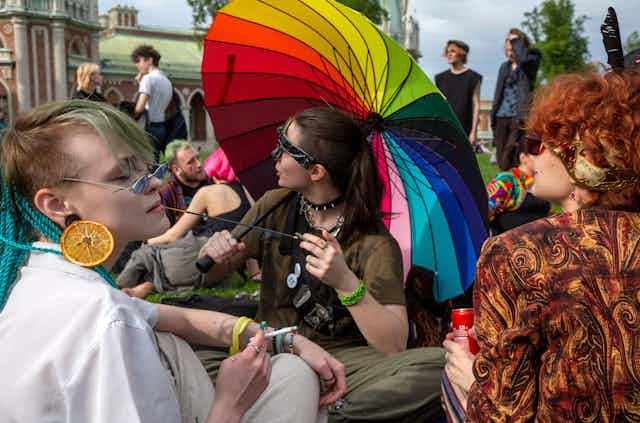Just over three decades after Russia decriminalised homosexuality in 1993, three people have been arrested and charged under the country’s harsh new anti-LGBT laws and could face ten years in prison for membership of an “extremist organisation”.
The arrests are a clear indication of how Russia has come full circle on its persecution of sexual minorities under Vladimir Putin.
On March 21, the district court of Orenburg city in south-western Russia ordered the arrest of nightclub owner Vyacheslav Khasanov. The nightclub, which is called Pose, has never explicitly identified as a gay club – styling itself as a “parody theatre bar”, it hosted parties with drag queen artists and go-go dancers as entertainment.
In a press release announcing the arrest, the court said that as the owner of the club, Khasanov organised participation in an extremist organisation, “acting as the leader of an organised group of persons by prior conspiracy”. The specific actions included organising the work of such premises, and publishing photos and videos from performances “promoting non-traditional sexual relationships and preferences”. Khasanov was arrested at the airport when trying to flee the country.
His arrest followed the arrest and detention of two of his employees. The club’s art director, Alexander Klimov, and administrator Diana Kamelyanova were arrested and sentenced to two-months pre-trial detention for, the Orenburg court said, “promoting non-traditional sexual relations among the visitors of the bar”.
These three people are the first victims of the new repressive legal norm. At the end of November 2023, the Russian Supreme Court ruled that the “international LGBT movement” is an “extremist organisation”. That decision effectively criminalised homosexuality, 30 years after it was decriminalised in 1993.
But now it isn’t sexual activity that is outlawed, it’s the identity itself. If you openly identify as queer you are a part of an extremist organisation and subject to prosecution.
Read more: 30 years of LGBTQ+ history in Russia: from decriminalisation in 1993 to 'extremist' status in 2023
Russia’s ‘gay propaganda law’
This has been a long time coming. In 2013 Russia enacted the so-called “gay propaganda law”. Ostensibly aimed at protecting minors from information promoting non-traditional sexual relationships, the law effectively worked as a blanket censorship ban, stifling any neutral to positive expressions related to homosexuality.
The law was problematic from the very beginning, with ambiguous and unclear wording. That resulted in arbitrary and selective implementation by the authorities. In one case, people were fined for holding a banner with the words: “Children have the right to know. Great people are also sometimes gay. Gay people also become great. Homosexuality is natural and normal.” Sharing LGBT-related information on social media or posting photos of people of same-sex kissing were also deemed to be LGBT propaganda and subject to legal sanction.

In 2022 the law was expanded from being something to protect children to a blanket restriction of “gay propaganda”. After this, the rhetoric shifted – it became popular for politicians to talk in terms of a “rainbow threat” or LGBTB activity as part of a “hybrid war” being waged by the west against Russia.
Homophobia unleashed
The 2022 law opened the floodgates for a spike in prosecutions. One of the first victims of the newly amended “gay propaganda law” were seven migrant trans women from Central Asia. The seven sex workers were fined and then deported in March 2023 under the propaganda laws after they published their profiles on a dating website.
Russia subsequently passed legislation imposing a blanket ban in July 2023 on “sex change” procedures as well as changing one’s gender identity on official documents and an array of other measures widely criticised as transphobic.
At around the same time, six different online streaming platforms were penalised for airing movies with LGBTQ-related scenes. Most of those movies were not, in fact, LGBTQ-themed at all - they included Bridget Jones: The Edge of Reason, Perfect Strangers and Green Book. But they were judged to include scenes that could be interpreted as “gay propaganda”.
As you would expect, this precedent has had a chilling effect and increased self-censorship in the media. When Russian cinemas screened Barbie last year, they blurred a scene featuring one man kissing another on the cheek.
Another television channel erased a rainbow from the music video of a K-pop band, making it grey. This feels apt – the grey rainbow could become symbolic of modern Russia.
This relentless crackdown highlights the extent of state repression faced by the LGBTQ community in Russia. The “gay propaganda law” with its random enforcement led to a climate of fear and persecution. The supreme court’s decision to label the international LGBT movement as extremist has effectively re-criminalised homosexuality.
What can be done?
Russia’s draconian homophobic measures have effectively silenced activism and forced many into hiding, perpetuating a cycle of discrimination and fear. Two things can be done today.
One way would be to support LGBTQ organisations that are still operating in the country. These groups need resources to keep providing legal advice and support to those facing arrest and prosecution. In extreme cases, funds may be needed to help and LGBT or trans people from the country when they find themselves in jeopardy.
Another is to write letters of support to people facing imprisonment for their “extremism” as members of the LGBT community. You can do that online through this service (letters must be in Russian only, but if you would like to send a letter of support but need help please contact the author).
Such are the times in which we live.

